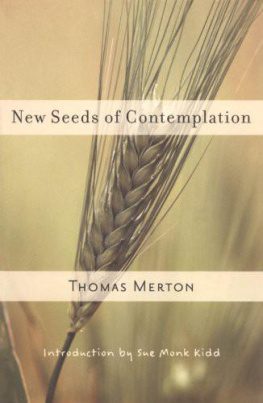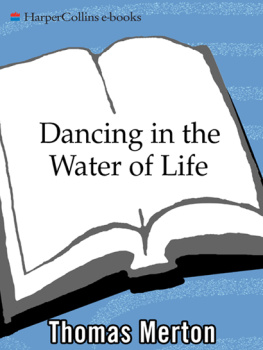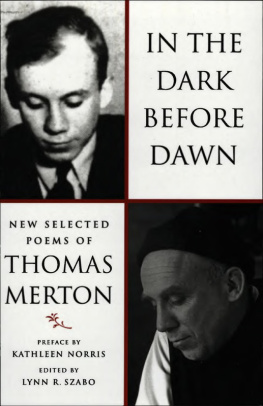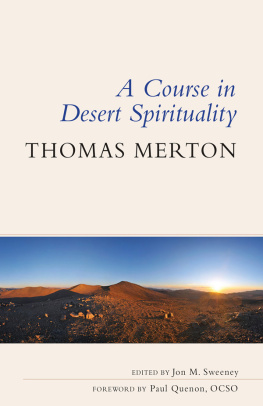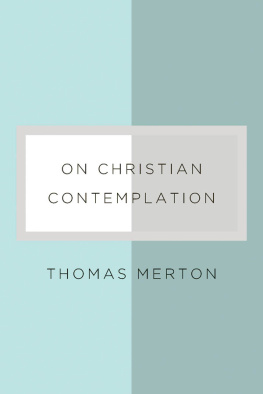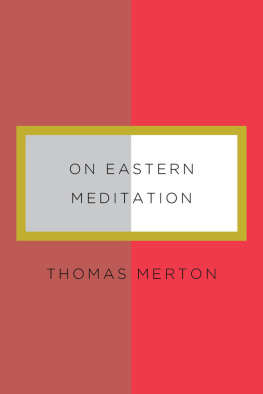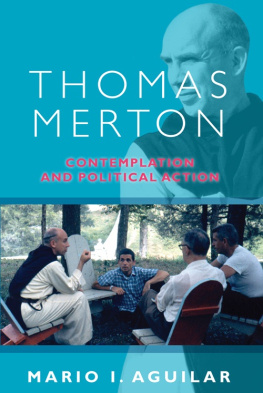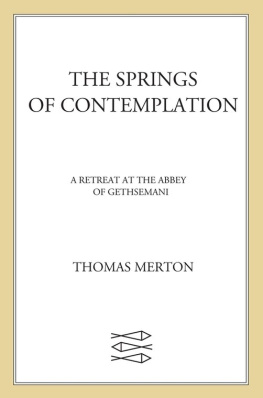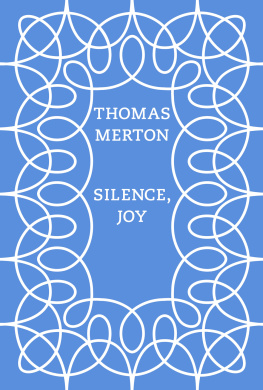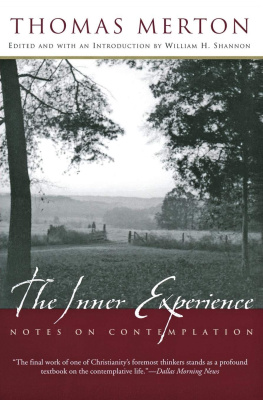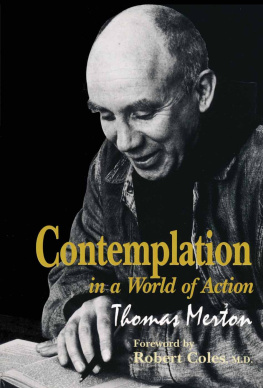New Seeds of
Contemplation
Thomas Merton
Introduction by Sue Monk Kidd

TU QUI SEDES IN TENEBRIS
SPE TUA GAUDE:
ORTA STELLA MATUTINA
SOL NON TARDABIT.
Copyright 1961 by the Abbey of Gethsemani, Inc.
Introduction copyright 2007 by Sue Monk Kidd
All rights reserved. Except for brief passages quoted in a newspaper, magazine, radio, or television review, no part of this book may be reproduced in any form or by any means, electronic or mechanical, including photocopying and recording, or by any information storage and retrieval system, without permision in writing from the publisher.
First published clothbound in 1962. First published as New Directions Paper-book 337 in 1972; reissued in 2007 as New Directions Paperbook 1091 with an Introduction by Sue Monk Kidd.
ISBN: 978-0-8112-1724-8
New Directions Books are published for James Laughlin
by New Directions Publishing Corporation,
80 Eighth Avenue New York 10011
Nihil obstat
James F. Rigney, S.T.D.
Censor Librorum
Imprimatur
Francis Cardinal Spellman
Archbishop of New York
EX PARTE ORDINIS
Nihil obstat
Fr. M. Paul Bourne, O.C.S.O.
Fr. M. Thomas Aquinas Porter, O.C.S.O.
Imprimi Potest
Fr. M. Gabriel Sortais
Abbot General
April 10, 1961
Contents
Introduction:
New Seeds of Contemplation
Sue Monk Kidd
I OPENED New Seeds of Contemplation for the first time during the winter of 1988 while visiting Thomas Mertons hermitage in the Kentucky woods about a mile from the Abbey of Gethsemani. Id made several trips to the monastery, but this was my first to the small, cinder-block house where Merton lived for the last few years of his life. I doubt there could be a more ideal location in which to read Mertons masterpiece on the contemplative life, but Im pretty sure I could have read the book on a bench in a shopping mall and it would have affected me similarlyas an occasion of awe and awakening. As an event that changed me.
I cannot help feeling an inclination to describe my experience. Im aware that some believe its indecorous to refer to oneself while introducing the work of another author, and still others insist that an introduction should steer away from the narrative form. But, Im a memoirist and a novelist. Its my propensity both to be personal and to tell a story.
When I made my pilgrimage to the hermitage, I was thirty-nine years old, flailing about in a profusion of busyness, struggling to balance my roles as mother, wife and writer, and keep pace with what seemed like a preposterous assortment of demands. People were often surprised by my gravitation to monasteries. I joked to them that my maiden name was, after all, Monk, and they joked that I was just tired and wanted to go off somewhere and lie down.
My guide that day was a thin, amiable monk with horn-rimmed glasses. As we set off from the monastery through the empty trees, he inquired how Id become interested in Merton.
Reading The Seven Storey Mountain, I told him. When he smiled, I added: Thats practically a religious cliche, isnt it?
Id read the autobiographical account of Merton becoming a Trappist monk ten years earlier at the age of twenty-nine. The book fairly stunned me. Having grown up in a Baptist family in a small town in the South, Id had no religious orientation to the contemplative life, no idea about monasteries or what sort of infectious mystery might compel someone to actually go to one.
Merton, himself, wrote about literature that initiates the reader into the ultimate cause of things, calling it wisdom literature, and applying the term to the work of Faulkner, for one. It was easy for me to apply the term to The Seven Storey Mountain. My experience of reading it initiated me into my first real awareness of the interior life, igniting an impulse toward being that I still felt a decade later.
Id gone on to read other of Mertons books, mostly his journals, but somehow, inexplicably, I hadnt yet read New Seeds of Contemplation, which was tucked in my purse, along with a small journal.
So, for you, Merton was essentially a contemplative? the monk said.
I nodded, startled slightly by the notion that Merton might be viewed as anything else. (Later I would wonder if that wasnt what my guide had in mind.) Id understood Merton almost exclusively as a man drawn by prayer, solitude and silence, the real essence of his life and work rooted in his pull toward being.
As I would discover, however, the light of Merton can be both wave and particle, ones vision of him highly influenced by ones own experience, need and initiation. Merton was, in fact, multi-faceted, complex, even self-contradictory, meaning he was able to hold within his extravagant personality a wide range of ambiguities, paradoxes and selves. Out of the great fertility and imagination of his soul rose a contemplative, monk, hermit, writer, poet, artist, intellectual, cultural critic, dissident, peace activist, ecumenical seeker, lover of nature and ordinary guy. A kind of Everysoul, he possessed an extraordinary ability to connect with deep, universal places inside of people. His life became a remarkably clear lens through which others glimpse their own self, especially the self their soul most demands. So, even before we reached the hermitage, it occurred to me I may have sculpted a personal image of Merton that had as much to do with my own longing to be, as it did with his.
The hermitage was enclosed by drifting floes of brown leaves, its cement-slab porch laden with firewood. I walked slowly through each room: a small kitchen; a bedroom with a quilt-draped bed pushed against the wall; a tiny room used for a chapel, its altar adorned with origami-shaped seed pods; a living room with a fireplace, a shelf of books, a wooden rocker (was this where Jacques Maritain sat on his visit here?), walking sticks propped in a corner, and an oil lamp on a desk before the front window. It smelled heavily of wood smoke.
With a stretch of time to myself, I settled at the desk and pulled New Seeds of Contemplation from my bag. In its pages I discovered Mertons powerful evocations on the true self.
Our vocation is not simply to be, but to work together with God in the creation of our own life, our own identity, our own destiny. To work out our identity in God. (32)
Ive never attempted to describe the experience I had upon reading that passage. Even now, so many years later, I dont know what to say about it except that it caused something hidden at the core of me to flare up and become known. If my reading of The Seven Storey Mountain inducted me into the mysteries of the interior life, waking an urge to be, New Seeds of Contemplation initiated me into the secrets of my true identity and woke in me an urge toward realness.
While seated at the desk, I copied a number of sentences from the book into the journal, which I recently dug out of its long obscurity in the back of a closet in order to read again. The lines I chose to write down reveal my own subjective experience with the book. They seem to me now like tiny panes through which I can glimpse the intimate yearnings of an earlier self.
I copied this rather telling passage:
Every one of us is shadowed by an illusory person: a false self We are not very good at recognizing illusions, least of all the ones we cherish about ourselves. (34)
And this one:
Contemplation is not and cannot be a function of this external self. There is an irreducible opposition between the deep transcendent self that awakens only in contemplation, and the superficial, external self which we commonly identify with the first person singular

